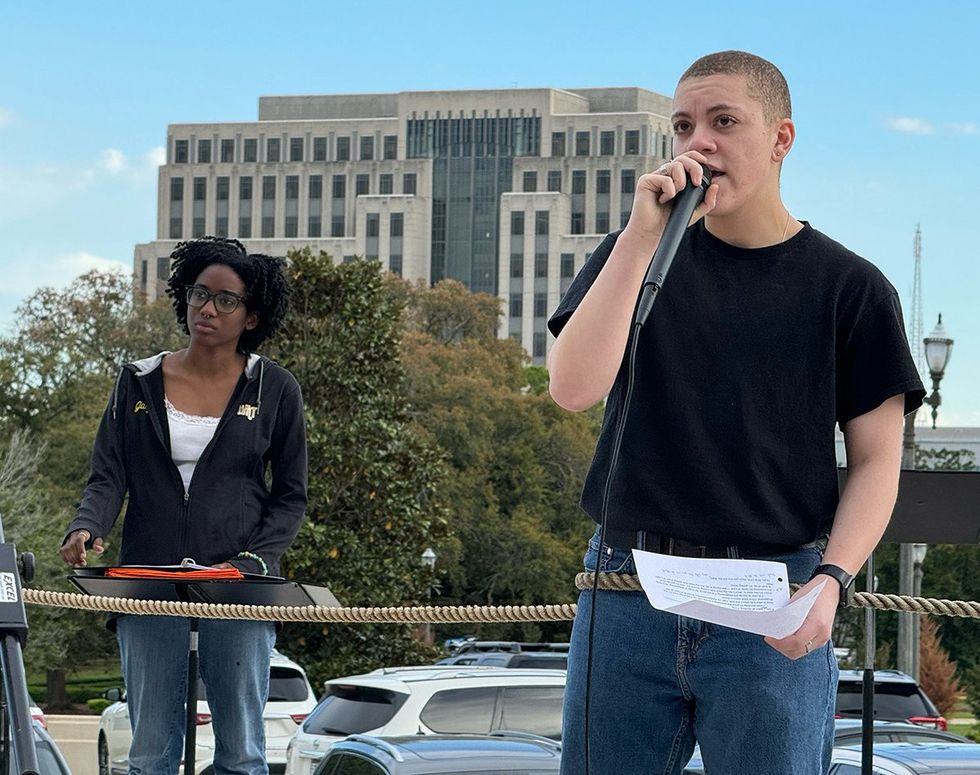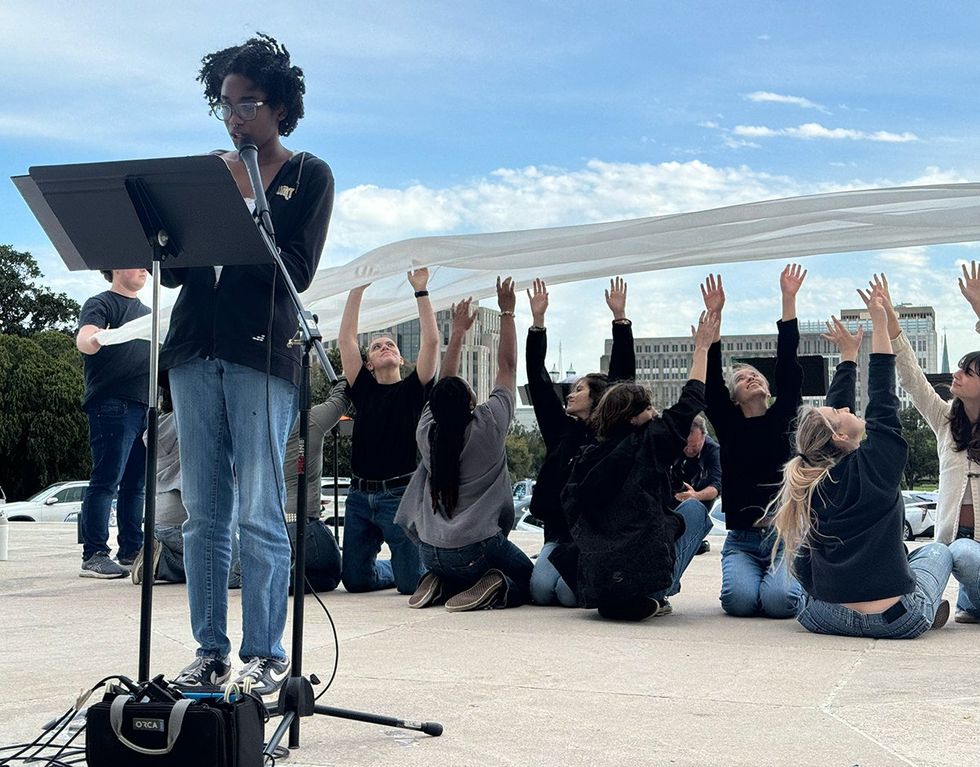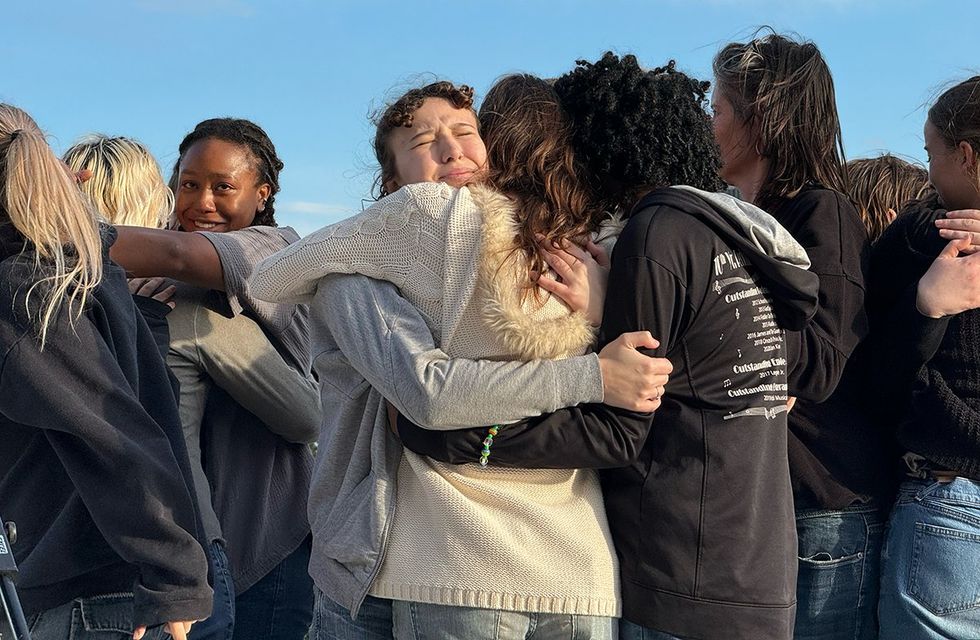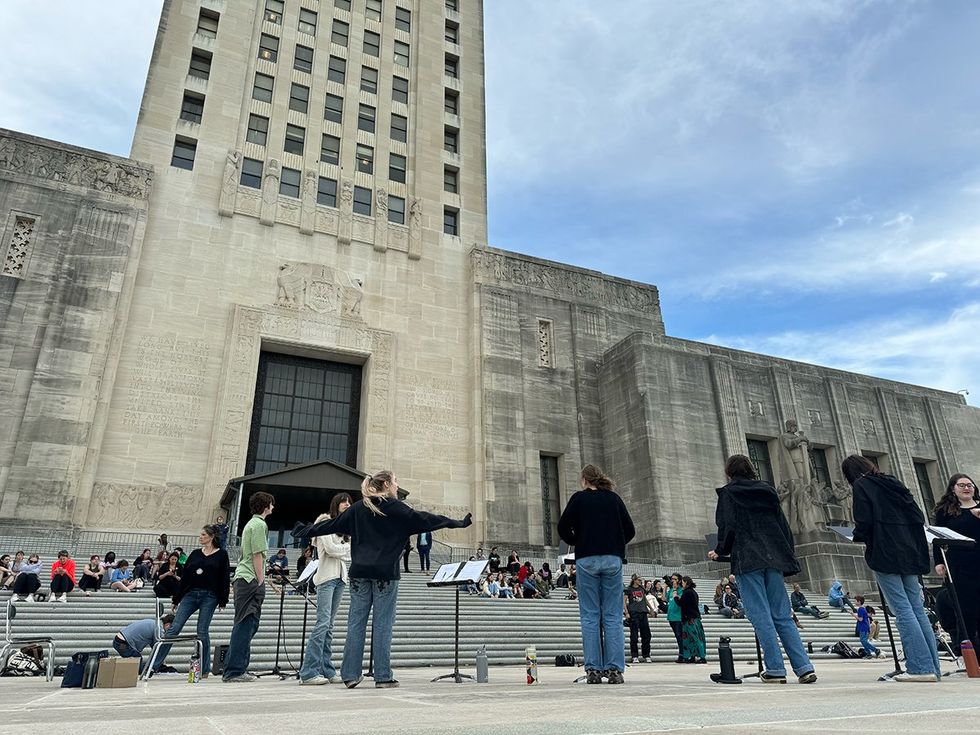Jude Armstrong stepped one foot in front of the other, balancing on a tightrope stretched across the steps of Louisiana’s state capitol building.
Nearby, a paperweight held down three printed-out pages of legislation, including one bill that would require parental consent for students to change their pronouns at school. An audience looked on as Armstrong lifted a microphone to speak.
“Who wants to grow up in a state that hates you so much?” asked Armstrong, 16, who identifies as queer and recently changed his pronouns.
While looking at the crowd, he stepped off the rope and onto the ground. Two classmates then picked up the rope and wrapped it around his waist.
 Courtesy Matt Bloom
Courtesy Matt Bloom
“All they want is for you to hate yourself,” Armstrong said to the audience. “That is the cruelest form of violence I can imagine.”
The stunt was part of a 45-minute-long performance by students from New Orleans’ Benjamin Franklin High School. The cast of 13 students traveled to Baton Rouge on March 27 to protest several anti-LGBTQ+ bills up for consideration by the Republican-controlled House and Senate.
The proposals include the pronoun use bill, as well as restrictions on sex-based bathroom use, effectively banning transgender people from using bathrooms that align with their gender identity. Another bill would restrict school employees from discussing their sexual orientation, which critics say mimics Florida’s “don’t say gay” law. The bathroom passed committee on Monday. The others are still awaiting a committee hearing.
Supporters argue the changes would protect parental rights and public health. Jeff Landry, Louisiana’s recently-elected Republican governor, has said he supports the legislation.
 Courtesy Matt Bloom
Courtesy Matt Bloom
Pro-LGBTQ+ rights groups have condemned the measures, saying they harm vulnerable youth in a state that already bans trans student participation in sports and gender-affirming healthcare for minors. States with restrictions on student rights have seen a sharp rise in reported hate crimes against queer youth, according to a recent analysis by The Washington Post. (Nationwide, more than 479 anti-LGBTQ bills have been introduced this year.)
Students at Benjamin Franklin High School have been some of the most vocal opponents of Louisiana’s measures. Hundreds participated in a massive walkout against anti-LGBTQ+ bills during last year’s legislative session. The March theatre performance marked the largest public protest of this year’s proposals.
More than a dozen students from Benjamin Franklin made up the cast. Through a series of short vignettes, they explored their emotional and physical responses to proposed legislation. Scenes touched on a range of topics, including mental health, queer history, spirituality and self-defense.
Armstrong, a junior at Ben Franklin, used rope in his scene to symbolize the restrictions lawmakers are putting on youth, he said.
“It’s also intertwined with wanting to leave Louisiana and not being able to leave,” he said.
 Courtesy Matt Bloom
Courtesy Matt Bloom
Students with the school’s drama club and Gender and Sexuality Alliance conceived the performance idea in early March, shortly after Republican lawmakers filed the legislation. They wanted to send a message in a different way than a walkout, said Ava Kreutizger, a senior and president of the school’s GSA.
“I think it's harder for people to actually sign these bills when you're staring at us and seeing what it will do and see our raw emotion,” Kreutizger said.
The school’s drama club had recently produced a performance of The Laramie Project, and connected with Jimmy Maize, a Broadway associate director and writer at the Tectonic Theatre Project, with the help of a drama teacher. The school hired Maize to workshop the performance over the course of three weeks.
The team used a technique called “devised theatre” to create their piece. The process involved group improvisation with dance, props, and student-written monologues, Maize said.
“It’s been beautiful,” Maize said. “The dream is that we change hearts and minds and then affect legislation.”
During their performance, many performers and audience members grew emotional. Several discussed depression, suicide and grief.
Kreutizger, the senior GSA president, spoke about the death of her best friend Belle Adelman-Cannon. The rising senior died suddenly after a school bus struck them in June 2023.
The 17-year-old, who used she, he, and them pronouns, was a leader of student activists, Kreutizger said.
“Belle never got the chance to grow old, but other queer kids could,” she said. “Please fight for us.”
It’s unclear if any lawmakers attended the performance, which was timed to start when the legislature was dismissed for the day. Several men and women in suits poked their heads out of the capitol’s front doors but quickly returned inside.
At least two lawmakers were seen using the capitol’s side exit to walk to their cars. None stopped to watch.
 Courtesy Matt Bloom
Courtesy Matt Bloom
Republican state Rep. Roger Wilder, the author of Louisiana’s proposed bathroom bill, said in a written statement he wasn’t aware of the protest. In response to questions about his bill, and potential harm to trans students, Wilder defended his proposal.
“I want to ensure that every person’s privacy is protected,” he said. “Women and little girls should not have to endure the harm of having their privacy, safety, or dignity violated by policies that permit men to enter into women-only spaces.”
Multiple studies have found no evidence that letting trans people use their preferred bathrooms increases public safety risks. Authors of Louisiana’s “don’t say gay” bill and pronoun use bill did not respond to requests for comment.
Following their performance, the Ben Franklin cast bowed and hugged. Armstrong, the junior tightrope walker, glanced around to see if there were any lawmakers in the audience.
Upon seeing none, they sighed.
“I don't think it's fair that they get to walk away from this because none of us can walk away from being queer, being trans and gay,” Armstrong said.


 Courtesy Matt Bloom
Courtesy Matt Bloom Courtesy Matt Bloom
Courtesy Matt Bloom Courtesy Matt Bloom
Courtesy Matt Bloom Courtesy Matt Bloom
Courtesy Matt Bloom


































































Charlie Kirk DID say stoning gay people was the 'perfect law' — and these other heinous quotes